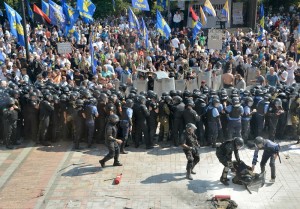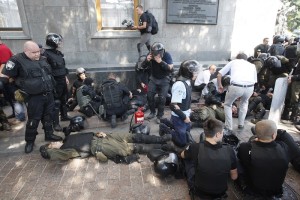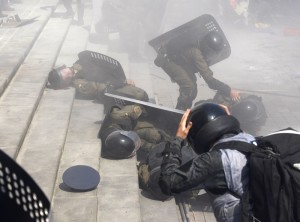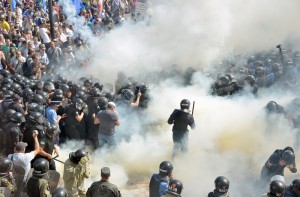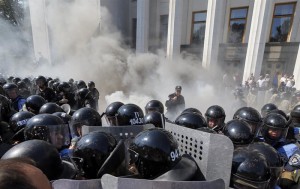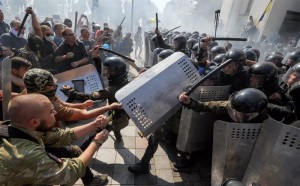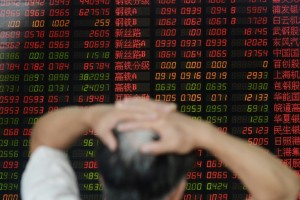Mes: agosto 2015
Guardsman killed in protests as Ukraine MPs back more autonomy for rebel regions
KIEV. A national guardsman was killed and nearly 90 others protecting Ukraine’s parliament were wounded by grenades hurled by protesters on Monday, the Interior Ministry said, as deputies backed reforms to give more autonomy to rebel-held areas.
The violence, which Interior Minister Arsen Avakov blamed on the main nationalist party, and division in the pro-Western camp in parliament suggested President Petro Poroshenko faces an uphill battle to push through key parts of a faltering peace agreement reached in February for eastern Ukraine.
https://youtu.be/mriKi5RYJuM
Poroshenko’s spokesman said the president would address the nation later on Monday following the clashes outside parliament, where deputies loyal to him managed to push through a first reading of a “decentralization” draft law – but only in the face of strong criticism from some of his political allies.
The violence came after the deputies voted by 265 in favor of the first reading of the bill – 39 more than that required to pass – at a boisterous session with many deputies shouting “Shame!” and rhythmically beating parliamentary benches.
Opponents of the bill said it played into Russia’s hands and would lead ultimately to Ukraine losing control over the Donbass – the name given to the industrialized east, swathes of which are controlled by separatists now.
https://youtu.be/pGvgKiQru2E
Interior Minister Arsen Avakov, in a tweet, said nearly 90 national guardsmen had been hurt, four of them with serious wounds to the eyes, stomach, neck and legs, by several explosive devices that were lobbed at them from crowds massed outside.
Blaming members of the main Ukrainian nationalist party, Svoboda (Freedom), Avakov addressed himself to Svoboda leader Oleh Tyahnybok, saying: “Tell me, how does Svoboda differ from the bastards who shoot at our national guard at the front?”
One of his advisers, Anton Geraschenko, said a 25-year-old national guardsman, who had been called up only in spring, had died of a gunshot wound in the heart.
En: reuters
Bolsas chinas borraron gran parte de las pérdidas de la sesión
Las bolsas de China cayeron con fuerza antes de recuperar gran parte de sus pérdidas en momentos en que los reguladores tomaban medidas contra los especuladores a los que Beijing responsabiliza por un desplome de un 40% en las mercados del país desde junio.
Los dos principales índices chinos se hundieron más de un 4% en un momento de la sesión, lastrando a los mercados de Asia, antes de limitar sus caídas por la tarde.
El referencial CSI300 de las principales acciones que cotizan en Shanghái y Shenzhen logró pasar a terreno positivo por la tarde, cerrando con un avance del 0.7% a 3,366.54 puntos. Pero el índice compuesto de Shanghái bajó un 0.8% a 3,207.07 unidades, informó la agencia Reuters.
Ambos índices retrocedieron alrededor de un 12% en agosto, en su tercer declive mensual consecutivo, y han caído cerca de un 40% desde mediados de junio y pese a las medidas sin precedentes del Ejecutivo chino para apuntalar el mercado.
Las acciones de las casas de valores cayeron, lideradas por CITIC Securities, después de que cuatro de sus ejecutivos confesaron haber usado información privilegiada. La investigación en CITIC Securities es parte de las últimas medidas de los reguladores contra las malas prácticas en el mercado.
Medios estatales chinos anunciaron hoy una serie de confesiones tras las investigaciones por la reciente agitación en las bolsas, entre ellas las de un periodista detenido que admitió haber difundido información falsa que causó “pánico y desorden”.
En: semanaeconomica
Diez datos esenciales para conocer la economía de China
China es el país con más habitantes en el mundo y el de más acelerado crecimiento económico. Es necesario conocer la composición de su economía para entender su influencia sobre los países desarrollados y los emergentes. Aquí, una primera radiografía.
1. En 16.3% se calcula la participación de la economía de China en el PBI mundial. Al 30 de junio, su economía había crecido en un 7%, aproximadamente.
2. Según el Banco Mundial, el PIB per cápita por paridad del poder adquisitivo (PPA) de China al 2014 es de US$ 13,216. El de Perú es de US$ 12,068. El más alto del mundo corresponde a Qatar: US$ 140,000. En 16.3% se calcula la participación de la economía de China en el PBI mundial. Al 30 de junio, su economía había crecido en un 7%, aproximadamente.
3. En el periodo 2010-2014, China mostró una inflación de 2.0%, y su tasa de desempleo se estima en un 4.0% a junio de este año. En 16.3% se calcula la participación de la economía de China en el PBI mundial. Al 30 de junio, su economía había crecido en un 7%, aproximadamente.
4. La tasa de interés de China ha ido disminuyendo desde noviembre del año pasado hasta llegar a 4.6% al 26 de agosto. Desde julio del 2012 hasta octubre del 2014 la tasa no se movió de 6%, aproximadamente. En 16.3% se calcula la participación de la economía de China en el PBI mundial. Al 30 de junio, su economía había crecido en un 7%, aproximadamente.
5. Un informe de la Oficina Nacional de Estadísticas de China afirma que los sueldos en los sectores privados del país aumentan más rápidamente que en el no privado. El salario promedio nacional fue de 49,969 yuanes (US$ 7,821). En 16.3% se calcula la participación de la economía de China en el PBI mundial. Al 30 de junio, su economía había crecido en un 7%, aproximadamente.
6. El salario mínimo creció en China entre el 8% y el 13% en los últimos diez años como parte de su cambio de modelo económico. En 16.3% se calcula la participación de la economía de China en el PBI mundial. Al 30 de junio, su economía había crecido en un 7%, aproximadamente.
7. La balanza comercial china se estima en US$ 195,000 millones a julio de este año. Los ingresos del Estado se calculan en US$ 230,000 millones y la deuda del Estado en US$ 4,218 millones. En 16.3% se calcula la participación de la economía de China en el PBI mundial. Al 30 de junio, su economía había crecido en un 7%, aproximadamente.
8. Computadoras, equipos de radiodifusión, teléfonos, componentes para máquinas de oficina y circuitos integrados, son los productos que más exporta China al mundo. En 16.3% se calcula la participación de la economía de China en el PBI mundial. Al 30 de junio, su economía había crecido en un 7%, aproximadamente.
9. Petróleo crudo, circuito integrado, mineral de hierro, oro y automóviles, son los productos más importados por China principalmente de Japón, Corea del Sur, Estados Unidos, Alemania y de otros países de Asia. En 16.3% se calcula la participación de la economía de China en el PBI mundial. Al 30 de junio, su economía había crecido en un 7%, aproximadamente.
10. Se calcula que por cada 100 personas, 50 están conectadas a Internet, y que 92.3 por cada cien personas están abonados a un teléfono celular. En 16.3% se calcula la participación de la economía de China en el PBI mundial. Al 30 de junio, su economía había crecido en un 7%, aproximadamente.
Fotogaleria en: gestion
China: Le extraen 26 cucarachas del oído
https://youtu.be/IJOc_2O4wfE
CHINA.- Un joven de 19 años de edad acudió al médico debido a que sentía mucha comezón y un fuerte dolor en el oído, sin embargo, luego de que le realizaran una exploración en la oreja, encontraron algo impactante.
El doctor Yang Jing, médico del Hospital Chang’an Xiaobian en la región del sur de China de la provincia de Guangdong, informó que observó decenas de insectos bloqueando el canal auditivo por completo.
Al momento de la extracción encontró 25 cucarachas bebés y una cucaracha hembra adulta.
Los doctores que atendieron al joven –identificado únicamente como Li–, mencionaron que tal vez una cucaracha hembra se había alojado en el oído de Li varias semanas antes colocando ahí sus huevos. (Especial El Intransigente)
China castiga a 197 personas por reportes falsos en Internet
Fueron sancionados quienes informaron de una cifra inflada de muertes en Tianjin y de un suicidio por la caída de la bolsa
Beijing. Casi 200 personas fueron sancionadas recientemente en China por esparcir reportes falsos en Internet, reportó la prensa local el lunes.
Entre las personas amonestadas dentro de una campaña del gobierno chino contra los rumores en internet, se encuentran quienes informaron sobre una cifra inflada de muertes en las explosiones de Tianjin y de un supuesto suicidio a causa de la caída de la bolsa.
La agencia oficial Xinhua citó al Departamento de Seguridad Pública al informar que se castigó a 197 personas durante una campaña especial, pero no especificó en qué periodo de tiempo.
Durante los dos últimos años, las autoridades han lanzado una campaña para detener los rumores falsos en el Internet de China, resaltando que se necesita poner fin a la falta de ética y al comportamiento indecoroso en línea.
Los detractores de la campaña señalan que la campaña también tiene el objetivo de reprimir las críticas al Partido Comunista.
En la última fase de esta campaña se cerraron 165 cuentas en línea, dijo Xinhua citó al departamento.
Entre los rumores que circularon se encuentra el del “hombre que se suicidó en Beijing debido a la caída de la bolsa” y que “al menos 1.300 personas fallecieron en las explosiones de Tianjin”. Hasta este lunes la cifra oficial de muertos por las explosiones del 12 de agosto en un almacén de materiales peligrosos es de 158.
El departamento agregó que algunas de las personas fueron castigadas por esparcir rumores sediciosos sobre las próximas conmemoraciones del 70 aniversario del fin de la Segunda Guerra Mundial, que se celebrará el jueves en China, con un gran desfile militar en Beijing.
Fuente: AP
En: elcomercio
Journalist ‘confesses’ to causing China market chaos
A FINANCIAL journalist has “confessed” to causing “panic and disorder” on China’s stock market and inflicting “huge losses on the country”, state media reported on Sunday.
Wang Xiaolu, a journalist with Caijing magazine, was detained by Chinese authorities following China’s recent stock market crash.
Wang was held for fabricating and spreading fake information on securities and futures market, according to Xinhua, a state-run news agency.
According to the report, Wang “confessed” that his “false information” had “caused panics and disorder at [the] stock market, seriously undermined the market confidence, and inflicted huge losses on the country and investors”.
Wang wrote a story in July saying the securities regulator was studying plans for government funds to exit the market.
The China Securities Regulatory Commission (CSRC) quickly denied the Caijing story, labelling it “irresponsible”.
But Caijing said it “defended journalists’ rights to do their duty under the law”, according to a statement posted on its website.
Xinhua reported that authorities had also detained an official from China’s securities watchdog and four senior executives of the country’s major securities dealer for “stock market violations”.
Liu Shufan, an official with the CSRC was held on suspicion of insider dealings, taking bribes and forging official seals, said the report.
Liu “confessed” that he has forged official seals to fake a court ruling on divorce and taxation certificates for his mistress.
Chinese state media regularly carries what it presents as confessions of suspects in high-profile cases.
Formal arrest in China normally comes after some time in police detention, when the case is handed to prosecutors, with trial and conviction almost guaranteed.
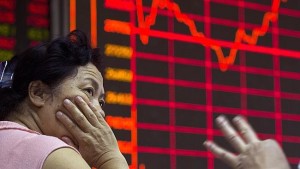
Caijing magazine journalist Wang Xiaolu wrote a story in July saying the securities regulator was studying plans for government funds to exit the market. Source: AP
The news agency also reported that 197 people have been punished in a special campaign by Chinese police targeting online rumours about China’s stock market, the recent fatal explosions in Tianjin and “other key events”.
No details of the punishments were given, but according to the report, the crimes punished included claiming a man had jumped to his death in Beijing due to the stock market slump, falsifying the number of people who had died in the Tianjin blasts, and circulating “seditious” rumours about China’s upcoming commemorations of the 70th anniversary of the end of World War II.
Wang was one of 11 people summoned by Chinese police on Tuesday to assist investigations related to illegal stock market activities, as the government targeted volatility on the exchanges.
The Chinese government launched an unprecedented rescue package as the stock market plummeted 30 per cent from mid-June, which included a crackdown on short-selling and funding a state company to buy shares on its behalf.
The CSRC said earlier this month that the China Securities Finance Corp. — a state-backed company tasked with buying shares — would continue to have a role for a “number of years”, but would only enter the market during times of volatility.
The CSRC comments were widely seen by investors as a signal of less government intervention in the stock market.
Separately, eight people from Citic Securities, the country’s top brokerage by assets, are also suspected of illegal trading, including managing director Xu Gang, media reports said. No specific details were given.
A current CSRC employee who worked on public offerings and one former employee involved with market regulation are suspected of insider trading and forging official documents, the reports said.
Also, the China Financial Futures Exchange said on Wednesday it had restricted 164 clients from opening positions as a punishment for “abnormal trades”, according to a report by state media.
The restriction will last one month, the report added.
En: new.com.au
Kentucky clerk takes same-sex marriage license battle to US supreme court
Rowan County clerk Kim Davis asks the highest court for permission to deny marriage licenses to same-sex couples on grounds of religious freedom

Rowan County Kentucky clerk Kim Davis shows emotion as she is cheered by a gathering of supporters during a rally on the steps of the Kentucky state capitol on Saturday. Photograph: Timothy D. Easley/AP
Two months after it legalized gay marriage nationwide, the US supreme court is being asked by a Kentucky county clerk for permission to deny marriage licenses to same-sex couples.
Rowan County clerk Kim Davis objects to same-sex marriage for religious reasons. The supreme court says the constitution guarantees gay people have the right to marry, but Davis contends the first amendment guarantees her the right of religious freedom.
She stopped issuing all marriage licenses the day after the supreme court effectively legalized gay marriage nationwide in June.
Two gay couples and two straight couples sued Davis, arguing she must fulfill her duties as an elected official. A federal judge ordered Davis to issue the licenses and an appeals court upheld that decision. Davis’s lawyers said they petitioned the supreme court on Friday to delay that decision until her appeal is finished, a process that could take months.
Her attorneys with the Christian law firm Liberty Counsel wrote in their appeal to the court that Davis is seeking “asylum for her conscience”.
Justice Elena Kagan, who joined the majority opinion that effectively legalized gay marriage across the US, will hear Davis’s case.
University of Louisville law professor Sam Marcosson said he believes Kagan will deny Davis’s request based on the court’s earlier decision.
Davis has refused to comply with several court orders in recent weeks, turning away gay couples over and over. She says they could easily drive to a nearby county to get a marriage license. But gay couples argue they have a right to get a marriage license in the county where they live, work and pay taxes.
Davis has said she will not resign her $80,000-a-year job and will never issue marriage licenses to same-sex couples – even if the supreme court denies her request.
“If a (same-sex marriage) license is issued with Davis’s name, authorization and approval, no one can unring that bell,” she wrote the court. “That searing act of validation would forever echo in her conscience.”
Her attorney, Jonathan D Christman, wrote that forcing her to issue licenses is akin to forcing a person who objects to war into the battlefield, or forcing a person against capital punishment to carry out an execution.
Davis cannot be fired because she is an elected official. The legislature could impeach her, but that is unlikely given that many state lawmakers share her beliefs. The Republican president of the state senate spoke at a rally last week in support of Davis.
The gay couples that sued her could ask US district judge David Bunning to hold Davis in contempt. That would trigger another court hearing and would likely include testimony from Davis herself. The judge could then order hefty fines or even put her in jail until she complies with the order.
En: theguardian

